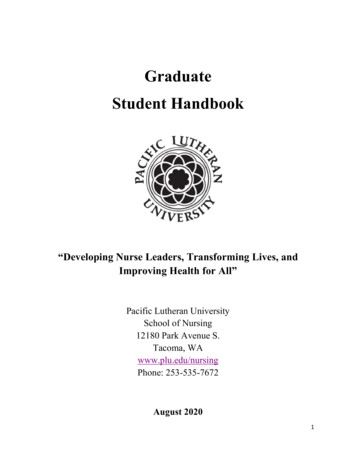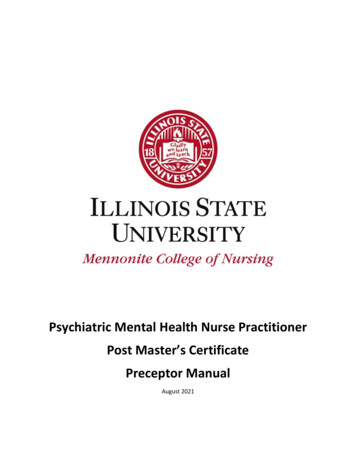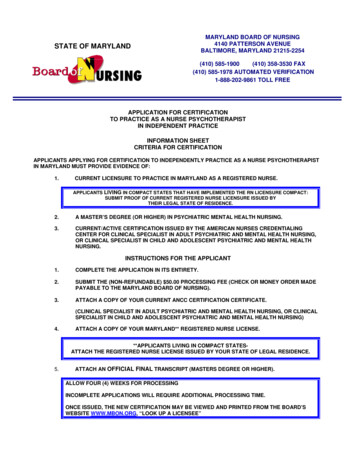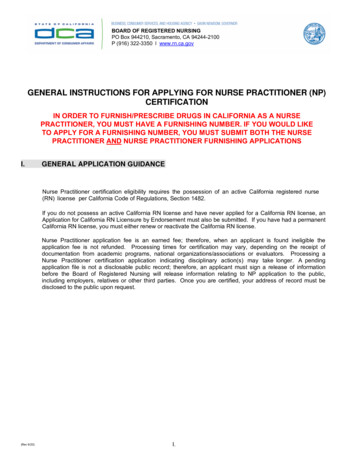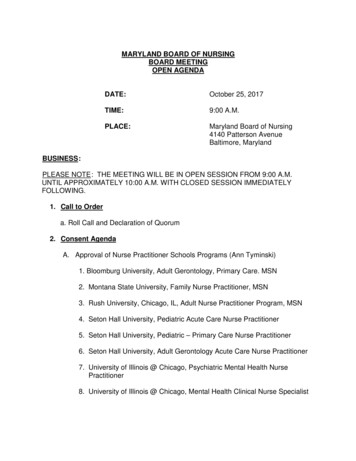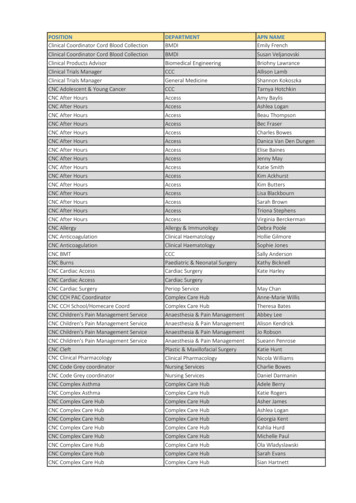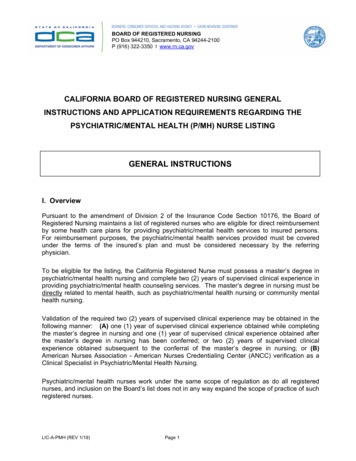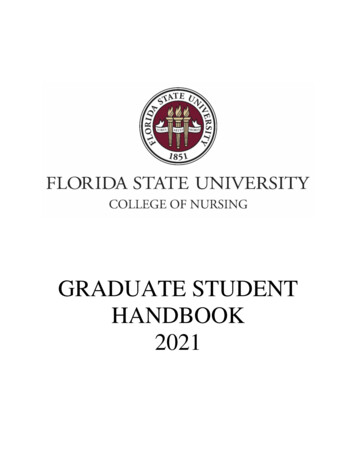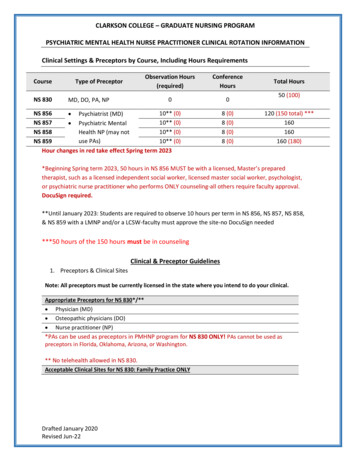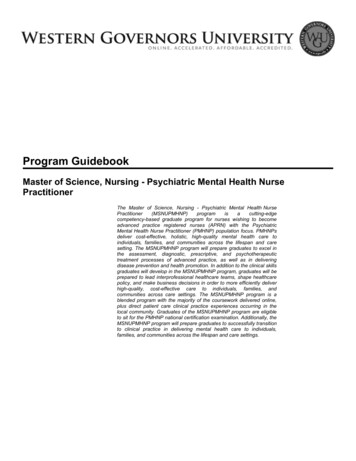
Transcription
Program GuidebookMaster of Science, Nursing - Psychiatric Mental Health NursePractitionerThe Master of Science, Nursing - Psychiatric Mental Health competency-based graduate program for nurses wishing to becomeadvanced practice registered nurses (APRN) with the PsychiatricMental Health Nurse Practitioner (PMHNP) population focus. PMHNPsdeliver cost-effective, holistic, high-quality mental health care toindividuals, families, and communities across the lifespan and caresetting. The MSNUPMHNP program will prepare graduates to excel inthe assessment, diagnostic, prescriptive, and psychotherapeutictreatment processes of advanced practice, as well as in deliveringdisease prevention and health promotion. In addition to the clinical skillsgraduates will develop in the MSNUPMHNP program, graduates will beprepared to lead interprofessional healthcare teams, shape healthcarepolicy, and make business decisions in order to more efficiently deliverhigh-quality, cost-effective care to individuals, families, andcommunities across care settings. The MSNUPMHNP program is ablended program with the majority of the coursework delivered online,plus direct patient care clinical practice experiences occurring in thelocal community. Graduates of the MSNUPMHNP program are eligibleto sit for the PMHNP national certification examination. Additionally, theMSNUPMHNP program will prepare graduates to successfully transitionto clinical practice in delivering mental health care to individuals,families, and communities across the lifespan and care settings.
Understanding the Competency-Based ApproachPractically speaking, how do competency-based programs like those offered at Western GovernorsUniversity (WGU) work? Unlike traditional universities, WGU does not award degrees based oncompletion of a certain number of credit hours or a certain set of required courses. Instead, you will earnyour degree by demonstrating your skills, knowledge, and understanding of important concepts.Progress through a degree program is governed not by the amount of time you spend in class but by yourability to demonstrate mastery of competencies as you complete required courses. Of course, you willneed to engage in learning experiences as you review competencies or develop knowledge and skills inareas in which you may be weak. To help you acquire the knowledge and skills you need to completeyour courses and program, WGU provides a rich array of learning resources. Your program mentor willwork closely with you to help you understand the competencies required for your program and to help youcreate a schedule for completing your courses. You will also work closely with course instructors as youengage in each of your courses. As subject matter experts, course instructors will guide you through thecontent you must master to pass the course assessments.The benefit of this competency-based system is that it enables students who are knowledgeable about aparticular subject to make accelerated progress toward completing a degree, even if they lack collegeexperience. You may have gained skills and knowledge of a subject while on the job, accumulatedwisdom through years of life experience, or already taken a course on a particular subject. WGU willaward your degree based on the skills and knowledge that you possess and can demonstrate—not thenumber of credits hours on your transcript.AccreditationWestern Governors University is the only university in the history of American higher education to haveearned accreditation from four regional accrediting commissions. WGU's accreditation was awarded by(1) the Northwest Commission on Colleges and Universities, (2) the Higher Learning Commission of theNorth Central Association of Colleges and Schools, (3) the Accrediting Commission for Community andJunior Colleges of the Western Association of Schools and Colleges, and (4) the Accrediting Commissionfor Senior Colleges and Universities of the Western Association of Schools and Colleges. The university’saccreditation status is now managed by the Northwest Commission on Colleges and Universities(NWCCU), which reaffirmed WGU’s accreditation in February 2020. The WGU Teachers College isaccredited at the initial-licensure level by the Council for the Accreditation of Educator Preparation(CAEP) and by the Association for Advancing Quality in Educator Preparation (AAQEP). The nursingprograms are accredited by the Commission on Collegiate Nursing Education (CCNE). The HealthInformation Management program is accredited by the Commission on Accreditation for HealthInformatics and Information Management Education (CAHIIM). The College of Business programs areaccredited by the Accreditation Council for Business Schools and Programs (ACBSP).The Degree PlanThe focus of your program is your personalized Degree Plan. The Degree Plan is a detailed blueprint ofthe courses you will need to complete in order to earn your degree. The Degree Plan also lays out theaccompanying learning resources and assessments that compose your program. The list of courses inthe Degree Plan is often referred to as the standard path. The amount of time it takes to complete yourprogram depends on both the amount of new information you need to learn and the amount of time youplan to devote each week to study. Your program mentor and course instructors will help you assess yourstrengths and development needs to establish a study plan.Students vary widely in the specific skills and information they need to learn. For example, some studentsmay be highly knowledgeable in a particular subject matter and would not need to engage in new learningopportunities. Other students may find that portions of the program require them to learn new informationand that they need to take an online class or participate in a study module to acquire the knowledge andskills needed to fulfill program competencies in that area. Some individuals may be able to devote as littleMSNUPMHNP 202203 2019 Western Governors University 1/3/222
as 15–20 hours per week to the program, while others may need to devote more time. For this reason,pre-assessments are there to help your program mentor form a profile of your prior knowledge and createa personalized Degree Plan.How You Will Interact with FacultyAt WGU, faculty serve in specialized roles, and they will work with you individually to provide theguidance, instruction, and support you will need to succeed and graduate. As a student, it is important foryou to take advantage of this support. It is key to your progress and ultimate success. Upon yourenrollment, you will be assigned a program mentor—an expert in your field of study who will provide youwith regular program-level guidance and support from the day you start until the day you graduate. Yourprogram mentor will set up regular telephone appointments (weekly at first) with you, which you will beexpected to keep. The mentor will review program competencies with you and work with you to develop aplan and schedule for your coursework. Your program mentor will serve as your main point of contactthroughout your program—helping you set weekly study goals, recommending specific learning materials,telling you what to expect in courses, and keeping you motivated. In addition to regular calls, yourprogram mentor is available to help you resolve questions and concerns as they arise.You will also be assigned to a course instructor for each course. Course instructors are doctoral-levelsubject matter experts who will assist your learning in each individual course. When you begin a newcourse, your assigned course instructor will actively monitor your progress and will be in touch to offerone-on-one instruction and to provide you with information about webinars, cohort sessions, and otherlearning opportunities available to help you acquire the competencies you need to master the course.Your course instructor can discuss your learning for the course, help you find answers to contentquestions, and give you the tools to navigate the course successfully. In addition, you will communicatewith course instructors by posting in the online learning community and participating in live discussionsessions such as webinars and cohorts.For many of the courses at WGU, you will be required to complete performance assessments. Theseinclude reports, papers, presentations, and projects that let you demonstrate your mastery of the requiredcompetencies. A separate group of faculty members, called evaluators, will review your work todetermine whether it meets requirements. Evaluators are also subject matter experts in their field ofevaluation. If your assessment needs further work before it “passes,” these evaluators, who review yourwork anonymously, will provide you with instructional feedback to help you meet evaluation standardsand allow you to advance.Connecting with Other Mentors and Fellow StudentsAs you proceed through your Degree Plan, you will have direct contact with multiple faculty members.These communications can take a variety of forms, including participation in one-on-one discussions,chats in the learning communities, and live cohort and webinar opportunities. As a WGU student, you willhave access to your own personal MyWGU Student Portal, which will provide a gateway to your coursesof study, learning resources, and learning communities where you will interact with faculty and otherstudents.The learning resources in each course are specifically designed to support you as you developcompetencies in preparation for your assessments. These learning resources may include readingmaterials, videos, tutorials, cohort opportunities, community discussions, and live discussions that areguided by course instructors who are experts in their field. You will access your program communityduring your orientation course to network with peers who are enrolled in your program and to receivecontinued support through professional enrichment and program-specific chats, blogs, and discussions.WGU also provides Student Services associates to help you and your program mentor solve any specialproblems that may arise.OrientationMSNUPMHNP 202203 2019 Western Governors University 1/3/223
The WGU orientation course focuses on acquainting you with WGU’s competency-based model, distanceeducation, technology, and other resources and tools available for students. You will also utilize WGUprogram and course communities, participate in activities, and get to know other students at WGU. Theorientation course must be completed before you can start your first term at WGU.Transferability of Prior College CourseworkBecause WGU is a competency-based institution, it does not award degrees based on credits but ratheron demonstration of competency. However, if you have completed college coursework at anotheraccredited institution, or if you have completed industry certifications, you may have your transcripts andcertifications evaluated to determine if you are eligible to receive some transfer credit. The guidelines fordetermining what credits will be granted varies based on the degree program. Students entering graduateprograms must have their undergraduate degree verified before being admitted to WGU. To review moreinformation in regards to transfer guidelines based on the different degree programs, you may visit theStudent Handbook found at the link below and search for “Transfer Credit Evaluation.”Click here for the Student HandbookWGU does not waive any requirements based on a student's professional experience and does notperform a "résumé review" or "portfolio review" that will automatically waive any degree requirements.Degree requirements and transferability rules are subject to change in order to keep the degree contentrelevant and current.Remember, WGU's competency-based approach lets you take advantage of your knowledge and skills,regardless of how you obtained them. Even when you do not directly receive credit, the knowledge youpossess may help you accelerate the time it takes to complete your degree program.Continuous Enrollment, On Time Progress, and Satisfactory AcademicProgressWGU is a “continuous enrollment” institution, which means you will be automatically enrolled in each ofyour new terms while you are at WGU. Each term is six months long. Longer terms and continuousenrollment allow you to focus on your studies without the hassle of unnatural breaks between terms thatyou would experience at a more traditional university. At the end of every six-month term, you and yourprogram mentor will review the progress you have made and revise your Degree Plan for your next sixmonth term.WGU requires that students make measurable progress toward the completion of their degree programsevery term. We call this “On-Time Progress,” denoting that you are on track and making progress towardon-time graduation. As full-time students, graduate students must enroll in at least 8 competency unitseach term, and undergraduate students must enroll in at least 12 competency units each term.Completing at least these minimum enrollments is essential to On-Time Progress and serves as abaseline from which you may accelerate your program. We measure your progress based onthe coursesyou are able to pass, not on your accumulation of credit hours or course grades. Every time you pass acourse, you are demonstrating that you have mastered skills and knowledge in your degree program. Forcomparison to traditional grading systems, passing a course means you have demonstrated competencyequivalent to a “B” grade or better.WGU assigns competency units to each course in order to track your progress through the program. Acompetency unit is equivalent to one semester credit of learning. Some courses may be assigned 3competency units while others may be as large as 12 competency units.Satisfactory Academic Progress (SAP) is particularly important to students on financial aid because youmust achieve SAP in order to maintain eligibility for financial aid. We will measure your SAP quantitativelyby reviewing the number of competency units you have completed each term. In order to remain in goodMSNUPMHNP 202203 2019 Western Governors University 1/3/224
academic standing, you must complete at least 66.67% of the units you attempt over the length of yourprogram—including any courses you add to your term to accelerate your progress. Additionally, duringyour first term at WGU you must pass at least 3 competency units in order to remain eligible for financialaid. We know that SAP is complex, so please contact a financial aid counselor should you have additionalquestions. *Please note: The Endorsement Preparation Program in Educational Leadership is not eligiblefor federal financial aid.CoursesYour Degree Plan includes courses needed to complete your program. To obtain your degree, you will berequired to demonstrate your skills and knowledge by completing the assessment(s) for each course. Ingeneral there are two types of assessments: performance assessments and objective assessments.Performance assessments contain, in most cases, multiple scored tasks such as projects, essays, andresearch papers. Objective assessments include multiple-choice items, multiple-selection items,matching, short answer, drag-and-drop, and point-and-click item types, as well as case study and videobased items. Certifications verified through third parties may also be included in your program. Moredetailed information about each assessment is provided in each course of study.Learning ResourcesWGU works with many different educational partners, including enterprises, publishers, trainingcompanies, and higher educational institutions, to provide high-quality and effective learning resourcesthat match the competencies you are developing. These vary in type, and may be combined to create thebest learning experience for your course. A learning resource can be an e-textbook, online module, studyguide, simulation, virtual lab, tutorial, or a combination of these. The cost of most learning resources areincluded in your tuition and Learning Resource Fee. They can be accessed or enrolled for through yourcourses. Some degree-specific resources are not covered by your tuition, and you will need to coverthose costs separately. WGU also provides a robust library to help you obtain additional learningresources, as needed.Mobile Compatibility:The following article provides additional details about the current state of mobile compatibility for learningresources at WGU. It includes a list that can be referenced to determine the mobile friendliness of all corecourse materials used in a program.Student Handbook article: Can I use my mobile device for learning resources?Standard PathAs previously mentioned, competency units (CUs) have been assigned to each course in order tomeasure your academic progress. If you are an undergraduate student, you will be expected to enroll in aminimum of 12 competency units each term. Graduate students are expected to enroll in a minimum of 8competency units each term. A standard plan for a student for this program who entered WGU withoutany transfer units would look similar to the one on the following page. Your personal progress can befaster, but your pace will be determined by the extent of your transfer units, your time commitment, andyour determination to proceed at a faster rate. In addition, this program has set start dates for certaingroups of courses. Some course start dates cannot be accelerated.MSNUPMHNP 202203 2019 Western Governors University 1/3/225
Standard Path for Master of Science, Nursing - Psychiatric Mental Health NursePractitionerCourse DescriptionCUsTermProfessional Presence and Influence21Advanced Pathophysiology for the Advanced Practice Nurse41Essentials of Advanced Nursing Roles and Interprofessional Practice21Quality Outcomes in a Culture of Value-Based Nursing Care21Informatics for Transforming Nursing Care32Advanced Pharmacology for the Advanced Practice Nurse42Leadership and Management in Complex Healthcare Systems32Advancing Evidence-Based Innovation in Nursing Practice32Advanced Health Assessment for the Advanced Practice Nurse43Foundations of Advanced Psychiatric Mental Health Practice33The Assessment and Diagnostic Process of Psychiatric Nurse Practitioner Practice33Psychopharmacology for Advanced Psychiatric Mental Health Practice34Advanced Psychological Care of Adults and Older Adults Across Care Settings34Advanced Psychological Care of Children and Adolescents Across Care Settings34Psychiatric Mental Health Nurse Practitioner Clinical Internship I35Psychiatric Mental Health Nurse Practitioner Clinical Internship II35Psychiatric Mental Health Nurse Practitioner Clinical Internship III35Changes to CurriculumWGU publishes an Institutional Catalog, which describes the academic requirements of each degreeprogram. Although students are required to complete the program version current at the time of theirenrollment, WGU may modify requirements and course offerings within that version of the program tomaintain the currency and relevance of WGU’s competencies and programs. When programrequirements are updated, students readmitting after withdrawal from the university will be expected tore-enter into the most current catalog version of the program.MSNUPMHNP 202203 2019 Western Governors University 1/3/226
Areas of Study for Master of Science, Nursing - Psychiatric MentalHealth Nurse PractitionerThe following section includes the areas of study in the program, with their associated courses. Yourspecific learning resources and level of instructional support will vary based on the individualcompetencies you bring to the program and your confidence in developing the knowledge, skills, andabilities required in each area of the degree. The Degree Plan and learning resources are dynamic, soyou need to review your Degree Plan and seek the advice of your mentor regarding the resources beforeyou purchase them.MSN CoreProfessional Presence and InfluenceProfessional Presence and Influence is a masters-level course designed to guide students towards an enhanced state ofpresence, where therapeutic relationships are built between nurse and patient. Students will learn techniques for self-carepractices that result in enhanced mental and physical wellbeing and that ensure ethically-generated patient care. Presenceis an intrapersonal and interpersonal quality that allows the nurse to relate to others and to be aware of the world aroundthem. The characteristics of presence, which include holism, intimacy, sensitivity and adaptability, create a heightenedsense of awareness that fosters therapeutic relationships between the nurse and patient. Developing a mindful, authenticpresence is central to health and spiritual practices in several cultures and a major element of leadership. Students willintentionally develop a focused mindfulness practice that will influence patient outcomes and lead to conditions that createjoy in the workplace.This course covers the following competencies: Begin your course by discussing your course planning tool report with your instructor and creating your personalizedcourse plan together. The graduate promotes a healthy work environment by demonstrating a professional presence that includes selfawareness characteristics. The graduate develops solutions and strategies that build positive relationships and promote mindfulness in theworkplace. The graduate recommends social communication strategies and technologies to promote a sense of caring andbelonging. The graduate applies the principles of improvement science to solve the problem of hostility in the workplace andinitiate organizational change designed to promote health and joy in the workplace. The graduate implements the principles of academic writing to produce clear, concise, and evidence-based writtencommunications.Essentials of Advanced Nursing Roles and Interprofessional PracticeEssentials of Advanced Nursing Roles and Interprofessional Practice explores essential characteristics of the advancedprofessional nurse in the role of leader, educator, practitioner, or informatics specialist. In this course, students will applyevidence-based strategies to facilitate interprofessional collaboration on teams. Students will explore the role of nurses inadvocating for change at the bedside, as well as leading teams to advocate for health policy reform. Students will gatherand analyze data to identify patients and populations at risk and recommend policy change to improve health outcomes inthe community.This course covers the following competencies: Begin your course by discussing your course planning tool report with your instructor and creating your personalizedcourse plan together. The graduate recommends strategies for practicing lifelong learning skills to encourage the continuous improvementessential for practicing as an advanced nursing professional. The graduate recommends legal and regulatory policies that advocate for improved health outcomes in patients andpopulations. The graduate analyzes the roles and interaction of interprofessional team members to assess the resulting impact onhealthcare outcomes. The graduate analyzes organizational performance data to guide recommendations for improving healthcare outcomesand disseminating results to a professional community.MSNUPMHNP 202203 2019 Western Governors University 1/3/227
Quality Outcomes in a Culture of Value-Based Nursing CareQuality Outcomes in a Culture of Value-Based Nursing Care incorporates current standards of quality and safety within thecontext of value-based care. In a value-based healthcare system, the benefits are derived from measuring health outcomesagainst the cost of delivering the outcomes. These benefits are then extended to patients, providers, payers, suppliers, andsociety as a whole. This course introduces new healthcare delivery models, which stress a team-oriented approach topatient care and sharing of patient data so that care is coordinated, and outcomes can be measured easily. Emphasis isplaced on performance and quality improvement methods that underlie value-based nursing care. The nurse in advancedpractice today must exemplify the standards of quality and safety and be prepared to lead the delivery of value-basedpatient-centered care.This course covers the following competencies: Begin your course by discussing your course planning tool report with your instructor and creating your personalizedcourse plan together. The graduate analyzes the culture of continuous quality improvement and the provision of value-based care to optimizepatient outcomes using a systems-thinking analytic approach. The graduate develops a systematic process that incorporates quality measures and benchmarks to assessorganizational strengths and vulnerabilities. The graduate integrates performance and process improvement methodologies to develop solutions for identifiedquality and safety gaps in the practice setting. The graduate establishes measurable metrics and processes to evaluate the effectiveness of value-based carestrategies and initiatives.Informatics for Transforming Nursing CareInformatics for Transforming Nursing Care integrates nursing science with multiple information and analytical sciences toidentify, define, manage, and communicate data, information, knowledge, and wisdom in nursing practice. Students willacquire knowledge and skills to apply informatics concepts, communications, and data that are critical to facilitatinginterprofessional data-driven decision-making. It is designed to build competence in the use of patient- and populationbased applications that inform and support the transformation of nursing care delivery toward a future of value-based qualitynursing care that improves health outcomes. This course aligns theoretical concepts with practical applications ofinformatics and is consistent with the functional areas and responsibilities of informatics nurses as defined by AmericanNurses Association Scope and Standards for nursing informatics.This course covers the following competencies: Begin your course by discussing your course planning tool report with your instructor and creating your personalizedcourse plan together. The graduate analyzes the theoretical and conceptual underpinnings of the nursing informatics scope and standards toimprove patient experience and health outcomes. The graduate determines how technology and informatics can be optimized to improve the patient experience andlower healthcare costs. The graduate analyzes core administrative systems to support the management of safe, cost-effective, and high-qualityhealthcare. The graduate analyzes data from population-based systems to mitigate public health threats and decrease incidence ofdisease. The graduate designs data collection tools and processes to capture, analyze, and report health indicators andoutcomes. The graduate refines data to visually represent, forecast, monitor, and report progress in meeting healthcare outcomes.Leadership and Management in Complex Healthcare SystemsLeadership and Management in Complex Healthcare Systems prepares graduate nurses to be thoughtful strategists andinformed decision makers who serve as strong leaders in high performing healthcare systems. Students developcompetencies for managing diverse teams in complex systems, monitoring and measuring organizational performance,allocating financial and human resources, and leading change towards a transformed healthcare system. Additionally,students acquire the knowledge and skills to become full partners with other healthcare professionals by demonstratingnurse contributions toward high-quality care to patients and populations, while working collaboratively with interprofessionalteams.MSNUPMHNP 202203 2019 Western Governors University 1/3/228
This course covers the following competencies: Begin your course by discussing your course planning tool report with your instructor and creating your personalizedcourse plan together. The graduate determines the effective leadership skills and approaches required to navigate a diverse staff in achanging healthcare environment. The graduate creates communication and change management plans to foster a culture of innovation. The graduate analyzes data to measure progress in meeting organizational performance indicators in complexhealthcare systems. The graduate determines system-level factors necessary to support and empower interprofessional teams. The graduate validates key performance indicators to measure the impact of nursing care on patient and populationoutcomes. The graduate proposes a strategic business plan to start a nurse-managed practice.Advancing Evidence-Based Innovation in Nursing PracticeAdvancing Evidence-Based Innovation in Nursing Practice introduces students to the dynamic union of healthcareinnovation and evidence. Core competencies and behaviors required to be a nurse innovator are discussed. Strategies formeasuring innovation at various system levels are presented, as well as techniques for synthesizing and disseminatingevidence to advance innovation in healthcare. The skills needed to appraise the quality of diverse sources of evidence arepresented within the framework of evidence-based practice. This course focuses on identifying new and emerging sourcesof evidence that can inform, translate, and scale the complexity of leading innovation in healthcare organizations. Studentswill experience building communities of practice for collaboratively developing innovative practices and policies designed toimprove the health of populations and enhance the patient experience of care.This course covers the following competencies: Begin your course by discussing your course planning tool report with your instructor and creating your personalizedcourse plan together. The graduate
The Master of Science, Nursing -Psychiatric Mental Health Nurse Practitioner (MSNUPMHNP) program is a cutting-edge competency-based graduate program for nurses wishing to become advanced practice registered nurses (APRN) with the Psychiatric Mental Health Nurse Practitioner (PMHNP) population focus. PMHNPs
